The Oral History of Looking , HBO's Short-Lived, Groundbreaking Gay Series
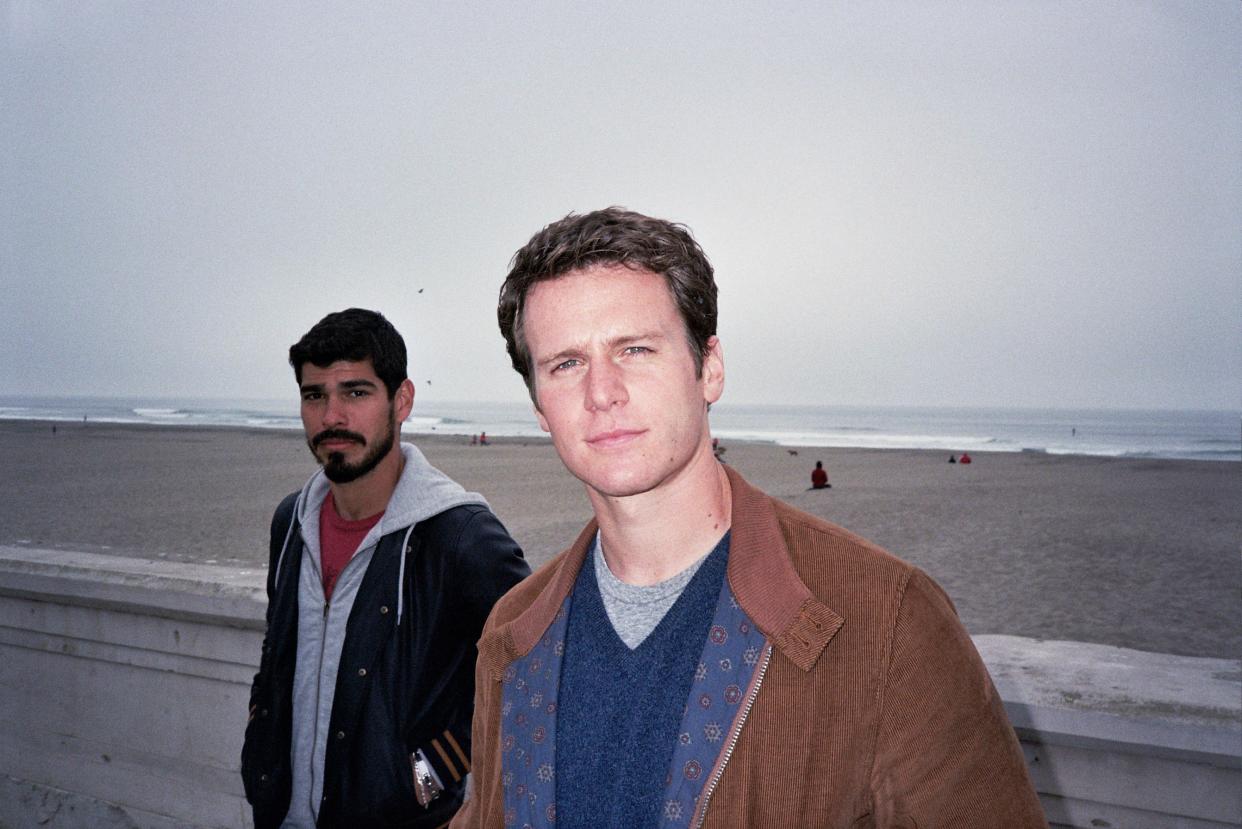
- Oops!Something went wrong.Please try again later.
- Oops!Something went wrong.Please try again later.
- Oops!Something went wrong.Please try again later.
- Oops!Something went wrong.Please try again later.
Photo: Courtesy of Andrew Haigh
This story was featured in The Must Read, a newsletter in which our editors recommend one can’t-miss GQ story every weekday. Sign up here to get it in your inbox.
What do you remember about January of 2014?
If you were a millennial—a member of the so-called next great generation—you were probably wasting all that potential by posting #gpoy on Tumblr, torrenting episodes of Game of Thrones, hashtagging tweets with #IWokeUpLikeThis, and slapping an Amaro filter on a picture of your latte art before posting it on that newfangled app Instagram.
And if you were a gay man, you were probably signing up to a CrossFit gym, looking into the availability of PrEP, debating the pros and cons of same-sex marriage and well, hashtagging tweets with #IWokeUpLikeThis. You were also probably anticipating the premiere of Looking, a sweet, unassuming show about a group of gay friends in San Francisco that had the honor—and then, the notoriety—of being HBO’s first series centered around gay men.
For two seasons and a TV movie, creator Michael Lannan and director Andrew Haigh (who was just coming off his breakthrough film Weekend and was years away from the award-winning 45 Years and All of Us Strangers) led the show’s cast and crew in crafting a new kind of gay TV show—raw, relaxed, character-driven and intimate. It didn’t fully work—in the end, Looking was cancelled due to low ratings—but a decade away from the show’s premiere, it’s clear that the show’s legacy lives on.
Onscreen, the cast of Looking—including stars-to-be like Jonathan Groff and Murray Bartlett—played characters who were working to find themselves while creating a chosen family with each other. Offscreen, the actors were doing the same thing, reckoning with their own identities and finding family in each other.
On the 10th anniversary of the show’s premiere in January 2014, GQ looks back on Looking, as told by Groff, Bartlett, Haigh, Lannan, Russell Tovey, Raúl Castillo, Lauren Weedman, Daniel Franzese and more from the creative team that made the beloved show.
Michael Lannan was a 30-something producer and assistant director who had worked on Sons of Anarchy and Damages. After writing and directing a short film, he took a stab at a feature script. He called it Lorimer; the story was about a gay man living in Brooklyn, his two best friends, and a guy he meets on the subway.
Michael Lannan (Looking creator): Through a random series of connections, it got in the hands of an executive at HBO and he read it and he liked the characters. It was just sort of a lightning-in-the-bottle meeting where we just clicked on the opportunity before us. There wasn't anything [on TV] with gay characters in the leads at that time. We also felt that there were sort of big generational shifts that had happened and were happening. It was sort of an in-between generation—things weren't life and death, nor were they super easy in terms of understanding your place in the world as a queer person.
Sarah Condon (Looking executive producer): There had been this desire to do a specifically gay show [at HBO]. And I think when this script came in, it was just like, This is the right time to do something about young gay men. The Showtime version of Queer as Folk had existed, but it was more slick, more surface. I think HBO was looking for something that was a little more intimate and emotional.
Lannan: The studios lag pretty far behind in terms of the culture in many ways. The economic structure is such that shows and movies generally require a lot of money and a lot of gatekeepers. But HBO is one of those rare special places that has been able to collapse that gatekeeping, take risks, and spend money on things that are maybe a little more current in the culture, or a little more risky.
Condon: I had been an executive at HBO for a long time. I ran comedy series for them and did Sex in the City, Curb Your Enthusiasm and The Comeback. I was also working on Bored to Death. I do think maybe partly it was my history with Sex and the City that HBO thought of me for this.
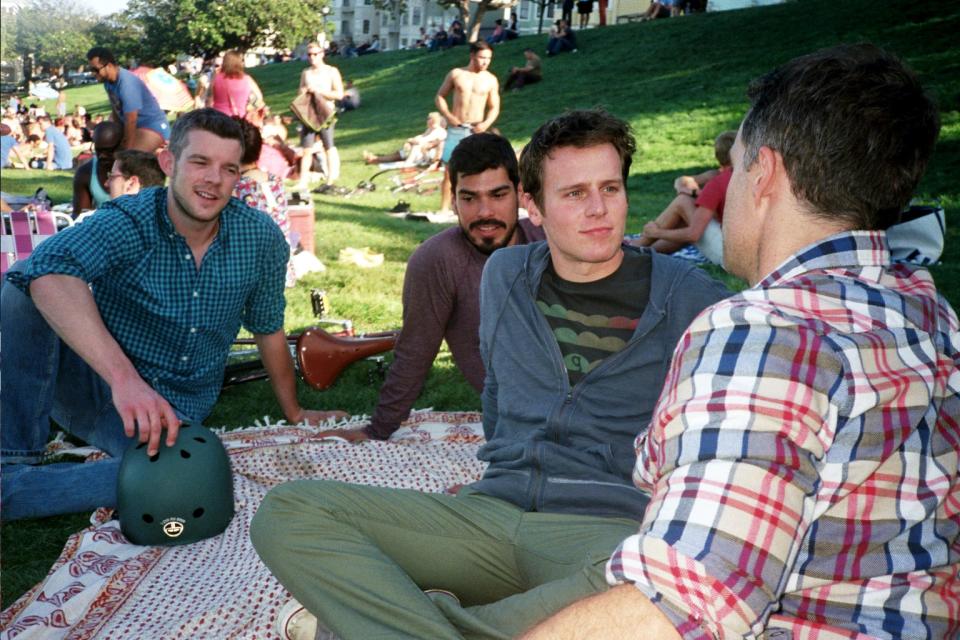
As HBO and Lannan were developing a half-hour TV-series pilot based on Lannan’s Lorimer pitch, Andrew Haigh’s film Weekend was released. Today, the film is recognized as one of the seminal queer films of the last few decades, but at the time, it was just a small indie film that premiered at the SXSW festival.
Andrew Haigh (director and Looking executive producer): They contacted me out of the blue. I was living in Norwich, which is a small town in the U.K., at the time. HBO contacted me and said, “Would you be interested in reading this pilot?” I'd only made Weekend, which was a tiny, tiny thing. Then suddenly I was on a fancy plane going to L.A. You know what I mean? It was fantastic.
Lannan: Andrew and I were both pretty green and naive. We were in awe that this was even happening. What the fuck? They're letting us shoot a pilot? This is crazy. It was fun, because it didn't really matter in a certain sense. It was just a weird adventure that somehow this is all happening. A lot of it was just like, “We don't know what the fuck we're doing. Let's just barrel in and see what happens.”
With Haigh signed on as director, the casting director Carmen Cuba was brought in to work on Looking. Cuba specializes in finding new and underrepresented talent—from Larry Clark’s Bully to the Netflix juggernaut Stranger Things—and has worked with some of the era’s most revered filmmakers, from Steven Soderbergh to Luca Guadagnino.
Carmen Cuba (Looking casting director): We didn't have a mandate [in terms of casting]. We were conscious of it [casting gay men]. It came up [during the process] I think because Andrew had done Weekend, and that was such a pivotal movie for so many people, gay and straight, but particularly gay men. I think the conversation flowed pretty freely once people were in the room with Andrew. People just were open about it.
Haigh: I can't remember there being pressure to cast bigger names. And then it's also, who were those bigger names? We didn't need all of the cast to be queer in real life, but we certainly wanted some of them to be.
Cuba: Especially in TV, you meet a lot of people… Pedro Pascal was someone we met [for a role on Looking] and from that, I put him on Narcos. The thing with Pedro, it was like he was testing on a million things. So many of these things, as you know in casting, it's just like scheduling. Does scheduling work? Does the group? Because in this, we were really casting a group.
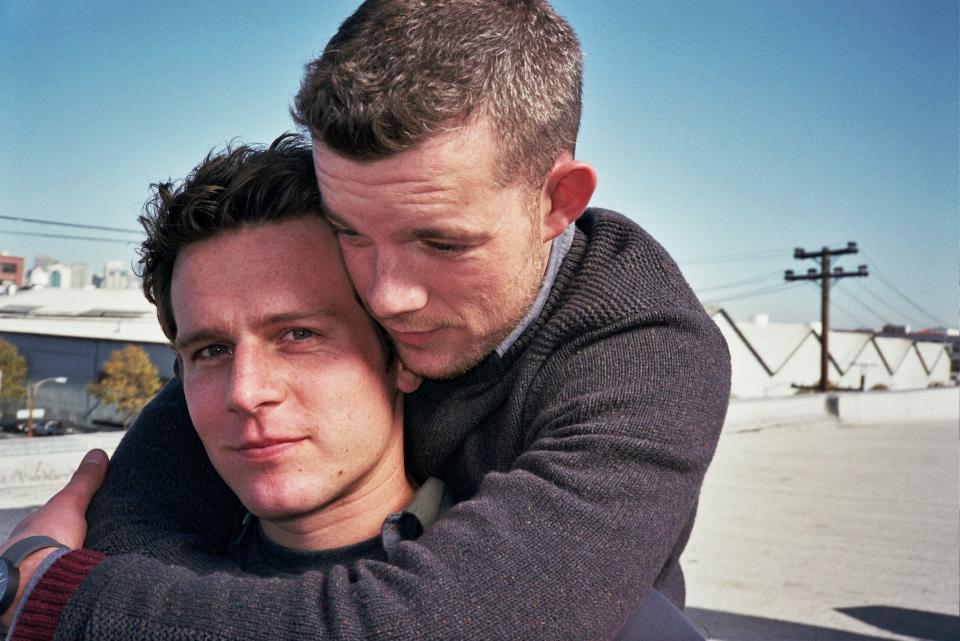
The first episode of Looking introduces a friend group composed of three gay men—the neurotic video game designer Patrick, the freewheeling artist’s assistant Agustin and the aspiring restaurateur Dom—and one straight woman, Doris. As the first season progresses, we’re introduced to Patrick’s love interests—Kevin, his charismatic boss, and Richie, a charming barber he meets on the train.
Raúl Castillo (Richie): I have probably been involved with Looking the longest [among the actors], actually. I did the short film that Michael Lannan wrote and directed. It was like these three friends walking through Williamsburg, Brooklyn trading stories about romance—essentially the prototypes for the three characters that were the leads of the show.
I auditioned for both Agustin and Richie, and I got turned down, actually, initially. They were not interested in me. I think Michael was met with some resistance. So I thought that I wasn't going to be casted. So I moved on and said yes to this off-Broadway play. And I was doing a play here in New York and then Michael reached out. He's like, “Can you put yourself on tape? We need it.” It was the first time that someone had said, “Just do it on your iPhone.”
Condon: We had a lot of guys self-tape and it was interesting. I think because of the nature of the show, because the scenes are somewhat intimate, and also because most people put themselves on tape in their own bedrooms, in a weird way it really allowed us to be able to see, Oh, this is what it's going to feel like.
Murray Bartlett (Dom): I was at a point where I’d been like, ‘Am I doing what I should be doing? Maybe I shouldn't be an actor anymore.’ I'd been living in New York for many years and I'd had some good opportunities and everything, but I was just feeling like things weren't going the way that I hoped they would. I was feeling frustrated.
My partner at the time was working on a film with this filmmaker in Egypt—he's Egyptian—and he was going there for a chunk of time, during the revolution, the Arab Spring. And I decided to step away from everything and just go with him and learn Arabic. I was an obvious tourist because I was whiter than everyone else, and so I grew a mustache to try and fit in because a lot of people had mustaches and beards and stuff. It didn't really work. But I had the mustache when the audition for Looking came up. I did my first taped audition from Cairo with a mustache, which I'm pretty sure had a big role in me getting the role of Dom.
Frankie J. Alvarez (Agustin): I was a couple years out of Juilliard and I was jumping around from regional theater to regional theater, different plays. For whatever reason, they saw my tape and they were like, “Maybe this guy's a good fit for Agustin.” I was just plucked from obscurity, and then all of a sudden [I get] my first role on camera where I speak. It's like, sign the papers, sign the contract, and then I take off my clothes and I'm making out with O-T Fagbenle [who played Agustin’s boyfriend Frank] and asking him to move in with me, you know? [Laughs]
Russell Tovey (Kevin): I was speaking to Andrew about Weekend at one point, and then Looking came up. I’ve always been out, [since] the start of my career, and I’ve always been very proud of that. But I hadn't done many gay roles, and I was determined to do a gay role that I felt like I wanted to just really come out with, I guess.
Andrew had come to see me at a play at the Royal Court. I don't know how I'd missed it, but we were on email talking about the film Weekend. I think one of the characters in it's called “Russell”—so if that is me or not, I don't know.
For the lead role of Patrick, the production looked at Jonathan Groff, the Tony-nominated Broadway star of Spring Awakening, who’d recently made the jump to TV with a splashy role on Ryan Murphy’s hit musical series Glee.
Haigh: I actually quite liked Glee. I thought it was a good show, but I wasn't sure he was going to be right. Then he came in, and I'm like, “Yeah, you're great for this.”
Condon: Jonathan just had all these qualities of vulnerability and also an amazing ability, which to me is very similar in some ways to Sarah Jessica Parker, of doing the comedy and drama together—not a lot of actors actually, can do both so well and flip back and forth between. He is one of those people.
Jonathan Groff (Patrick): I came out of the closet later—I came out publicly at 23, came out to my parents that same year too. I was out but I was, in a big way, not fully accepting myself. I came out of the closet because it felt more painful to be in than out at that point, but I didn't really feel myself own who I was until I had had the experience of Looking.
I remember auditioning for the show, and feeling heat on my skin during the audition. It was the scene with Patrick and Richie on the train, doing this flirtatious scene, and I remember my skin feeling hot, and it feeling scary and exciting at the same time. I felt raw and exposed in a way that I had never felt before. So there was a real vulnerability in that, that made me feel nervous and excited.
Cuba: Jonathan Groff was out, but he hadn't played a gay character before. And more than anyone, he was the most experienced on the show, even Andrew. So he definitely must have understood more than any of us, the fact that playing the role is one thing but he was then going to be in press talking about it. It's a different thing you're agreeing to, I assume.
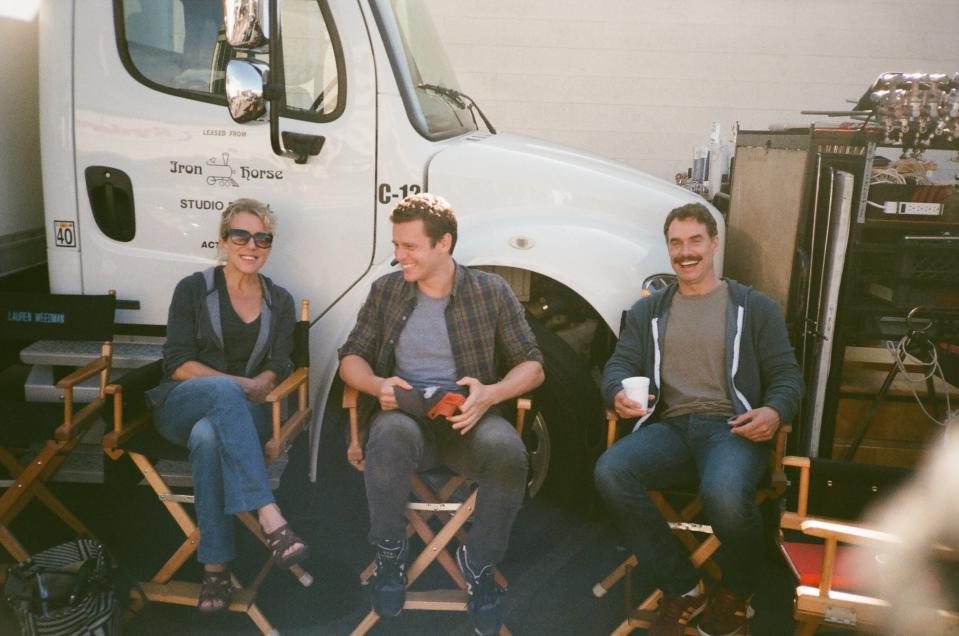
Most of Looking’s leads identified as gay men, with three notable exceptions: Frankie J. Alvarez, Raul Castillo, and Lauren Weedman, who played Doris, Dom’s best friend.
Castillo: The fact that it was on HBO and that it was on such a visible platform did give I think [some straight actors] pause, especially because we're talking about 10 years ago. I think that's why they had trouble casting the Richie role specifically. There was always that bit of nervousness about what it would do potentially, how it could have a negative effect on your career.
I've played gay characters throughout my career. I have many queer [and] gay friends. I never had any reservations about it. There are really few romantic lead [roles] for Latino actors, Latinx actors. There really are, especially 10 years ago. So for me, it was just really exciting to play a character who was ethnically very specific, who was a three-dimensional complex character.
Alvarez: It wasn't the first gay role that I've played and it was important for my community. I'm from Miami, Cuban American, Latino, and so I come from a background that not only is patriarchal, but has a tremendous amount of machismo.
Lauren Weedman (Doris): It's my world as well. I'm just surrounded by gay men—it’s all my best friends, all of my first boyfriends. When people are like, “Oh, you're so good at doing that character,” I was like, “Well, it's basically me.” It was not hard to do at all.
Early on, Looking distinguished itself from the gay shows that came before. Its grounded, raw aesthetic stood in sharp contrast to the slick, shiny surfaces of the American Queer as Folk and Sex and the City—two shows to which it would inevitably be compared to.
Condon: It was very specific from the get-go, making sure you get the fog and the clouds [of San Francisco]. There's a lot of blue colors in the show, and also kind of a faded, almost like ‘70s look that's a little bit of a hearkening back to Tales of the City.
Danny Glicker (Looking costume designer): I really wanted to fight against the idea that gay people were a platform for merchandising, that gay people were always being used to sell something. So I wanted the idea to be, you're going to watch a show about gay people and half the stuff that they're wearing is stuff that you don't necessarily want. I think that that was really important because before that, the landscape was the gay character was fashionable, [had] swoon-worthy closets, a new jacket every episode—and that's not how people live.
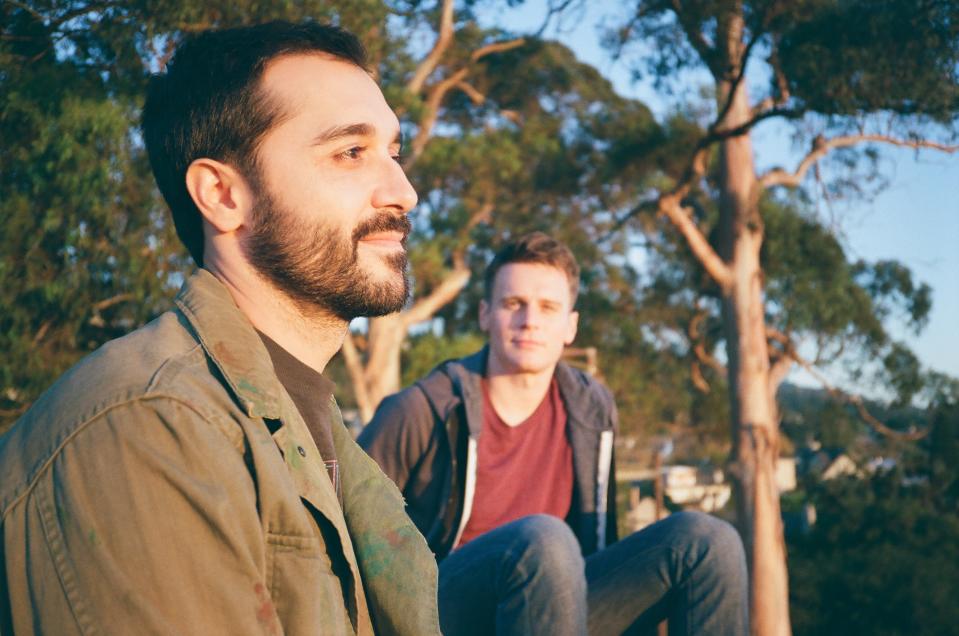
Filming for the first season began in September 2013. Transplanted to San Francisco, the cast and crew immediately found themselves bonding.
Condon: I think partly because we were all living in San Francisco, away from our families, it definitely had a feeling of summer camp. We had everybody come a week in advance. We did all kinds of karaoke and going to the Castro Theater and going on hikes and just all kinds of fun stuff.
Groff: I remember Murray, Frankie, and I showing up to San Francisco during pre-production in March of 2013—I mean, this is 10 years ago. I remember the month. I remember Murray making us dinner, and me and Frankie going over there, and smoking weed and smelling the jasmine in the backyard of Murray's sublet that he had gotten. I remember Frankie was freaking out, because he had graduated from Juilliard and is this brilliant actor, but had never done anything on screen before, and so we were talking about that. I mean, just immediately, we knew we had to have this believable friendship in order for the show to work. And so we just started hanging out and we never stopped.
Glicker: In the very beginning, I went on a shopping trip with each actor. It would be a whole day so it would be this bonding moment, but it was really about observing. We'd be in the neighborhoods where these characters would be living, shopping at the stores where they'd be shopping, and observing all the people, and were able to really breathe that air, bring it all in. I think those were the moments that the baseline was established.
Many aspects of gay life were in flux in the early 2010s—from the impending legalization of gay marriage to the growing popularity of the location-based LGBTQ hookup app Grindr.
Haigh: It really was happening in the moment. The world was changing. How do you deal with that change, and how do you navigate who you are within that time of change? We absolutely wanted to talk about those things.
Bartlett: It was an amazing experience because we were all transplanted into San Francisco and sort of living that life. So the story arcs were [created by] Andrew and Michael, but a lot of the details were coming from, I think, the experiences that we were having there.
Castillo: Danny [Glicker] was telling me how a lot of gay men at the time, who didn’t get to practice the same rituals of courting when they’re teenagers because they were closeted, have this second adolescence later as adults. He gave me the greatest gift for an actor, this insight into my character that led me to understand a lot of the interior life.
Groff: How specific it was with the clothing and the time period, and the issues that they were talking about in the show—they wanted it to feel, when we looked back 10 years later, 20 years later, 50 years later, like San Francisco at that time.
Even like Esta Noche, which is the bar that Richie is working at in the pilot episode, that bar closed while we were shooting, and the episode about that bar closing was a direct reflection of what was happening in San Francisco.
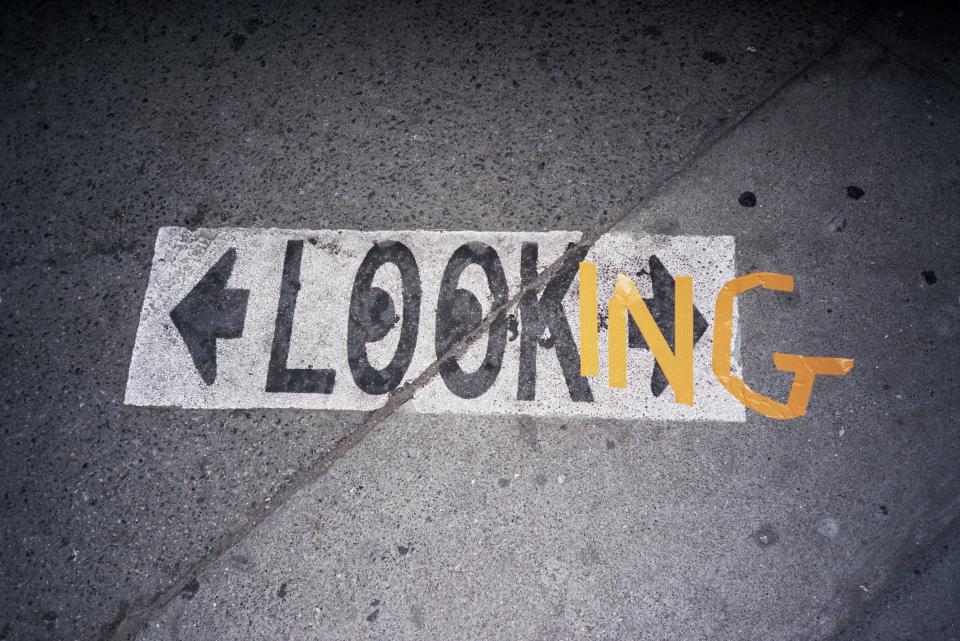
Tovey: I lived in the Castro on Diamond Street. You'd go past Harvey Milk's camera shop. You'd go to the Castro Theater. I'd go and get my coffee and it felt like I was part of a historical gay narrative. It was magic.
Bartlett: There’s so many layers of LGBTQ history there. You can just feel it in San Francisco. It's pretty extraordinary. And it's such a mixture of stuff—there's kind of a fire there and you feel a freedom there, but you also feel a lot of ghosts there. There's a lingering sort of melancholy about some of the things that went on there, particularly through the AIDS epidemic.
Groff quickly developed chemistry with Castillo, one of his onscreen love interests. While Castillo’s Richie was initially meant to be a minor character, the team later made the decision to make him part of the main cast.
Castillo: I remember standing on the platform in between takes with Jonathan [for our first scene together]. I remember our chemistry was developing and we were hitting it off, and I didn't want to ruin that but I also wanted to open up to him and be honest with him. I decided to tell him the story about meeting my now-wife, who at the time was my girlfriend. When she and I had met, there was an undeniable chemistry between us, like the minute we laid eyes on each other, it was just like there was this attraction. We were the only two people in the room in a room full of people. I wanted to tell Jonathan that story because I was relating it to Patrick and Richie meeting.
I was revealing to him that I was straight and he didn't bat a lash. He took it in, he listened and yeah, it was funny, because it was almost like a coming out.
Groff: I knew that he was straight, because I had asked our director or costume designer. I had gotten the intel already. It wasn't a shock. “That guy's cute. Is he gay?” [Laughs]
The series was groundbreaking in terms of portraying gay sexuality on a primetime TV series on a prestige network. The storylines often centered intimate, sometimes awkward aspects of gay male sexuality, from douching to bottom shame.
Condon: I mean, it sounds silly, in a way, but they were brave decisions. I remember having to have that conversation with Jonathan. “Are you up for this?” There were a lot of those kind of conversations. And Jonathan was so game, as was the whole cast.
Tovey: Intimacy, in itself, is probably harder to feel or really get right than just animalistic sex. To know that there is a hard dick there somewhere is a lot sexier than just having to see it.
Haigh: I definitely wanted intimacy rather than explicit sex for the sake of explicit sex. Watch porn if you want to watch explicit sex.
Lannan: The enema [storyline] was definitely something we had not seen before on TV. John Hoffman, one of our writers, really championed this idea. It goes so unspoken, right? In gay sex? Prepping for bottoming is not talked about or shown, especially at that time.
I think sometimes that vulnerability was a lot for people to take. Especially in the time it came out, I think it was maybe just a little much for people to see. Even gay people—it maybe cut a little too close to home in some ways. Even me sometimes, I watch it now and I'm like, “Ooh—we really spent a lot of time on that very intimate thing.”
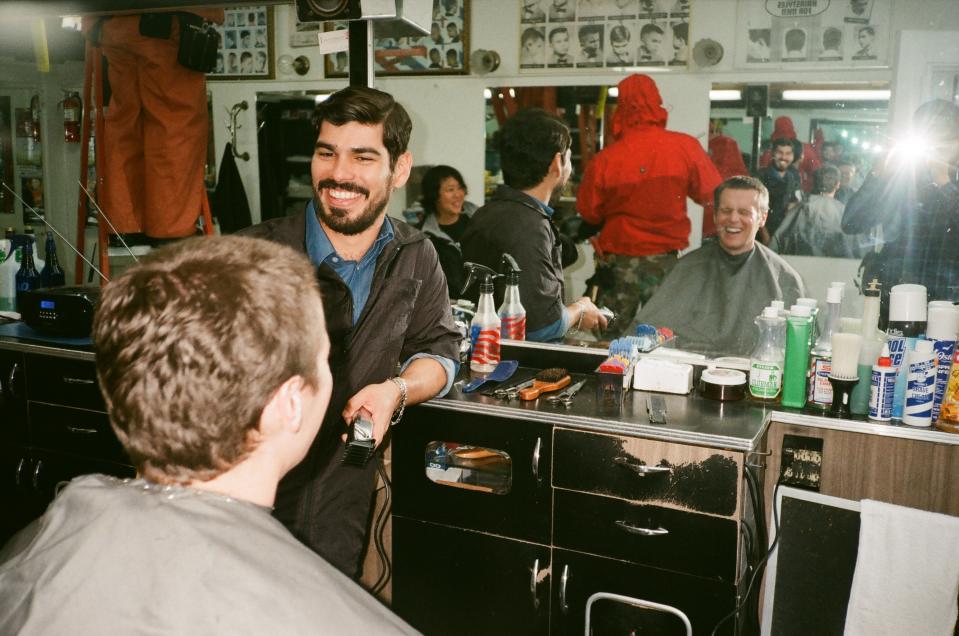
There was a lot of buzz in the run up to the show’s premiere. HBO threw their full support behind Looking.
Haigh: We all came down to L.A. and there were billboards everywhere. There's that big tower on Sunset in West Hollywood, and there was just a massive poster of Looking. I was like, “Oh, my God.”
Groff: I remember the premiere was at The Castro, and I remember feeling like I was in a fairy tale. The Castro, the audience is lit as fuck, and it's a lot of gays. They are there to celebrate, which is just such a special, unique energy at a premiere of any sort.
Michael Lombardo and Richard Plepler were running HBO at that time. I remember being at that premiere and Michael was standing there, talking about, “This is the first exclusively gay show we've ever had on our network.” It felt like, “Oh my God— we're in this. We're a part of this moment in history.” It felt like more than a TV show. It felt like a big deal when he would say that.
Despite all the excitement and press attention, the series eventually premiered to what Variety called “a slow start,” with an audience of just 338,000 (with the encore, it gained an audience of 606,000). Critical reception to the first few episodes was mixed too. An early review that called the series “boring” quickly became part of Looking’s narrative—a tag that became hard to live down. Beyond that, the gay community itself was very critical of the series, projecting different expectations on a show that, at the time, was arguably the only one that spoke for the community.
Condon: Andrew completely anticipated this, and I did not—that the gay audience is very critical of their own material, all the things that are made for them.
Bartlett: When it's one of the few things that gets to represent a queer perspective, then everyone wants it to be everything. And it was never intended to be that—and it would've been a mistake, I think, for it to be intended to be that.
Haigh: There were a lot of gay execs on the show, and a lot of gay people within the writer's room. It's a lot of burden of representation, that you can feel sometimes. It's quite heavy.
Tovey: That discourse around it at the time, especially from within the queer blogosphere, was quite negative and damaging. It did turn back positively within half of season one, but by that point there had been this position cemented in people's response to it. We were filming in San Francisco, and there would be people going, “What are you shooting?” “Oh, we're filming Looking.” They'd be like, “Oh, yeah, I'm not going to watch that.” I'm like, “Why?” They said, “Oh, we've heard it's boring.” I said, “But have you watched it?” They were like, “No.” It's in your city and it's about you.
Lannan: I will say that the discourse definitely got to HBO a little bit. We felt some things trickling back to us through them.
Alvarez: I think in a lot of ways it was kind of marketed as, like, a gay Sex in the City, but that's not what it was. And I think people wanted a level of camp—that's just not Andrew's style.
Haigh: I remember one of our first meetings, HBO were like, “This isn't the gay version of Girls. That's not what we're looking for. We're looking for [it to be] its own show.” But it became that at some point. Everyone was expecting it to be that.
Weedman: I was just comparing Looking to Golden Bachelor, actually. Because, like Looking, everyone's so strongly opinionated about it—all the old ladies have got [opinions]. No one's had a show like this [made about them] and so we all have opinions because we want this and we want [that]. So it's a good sign. It just means that it matters and people want it. It matters—which is so rare.
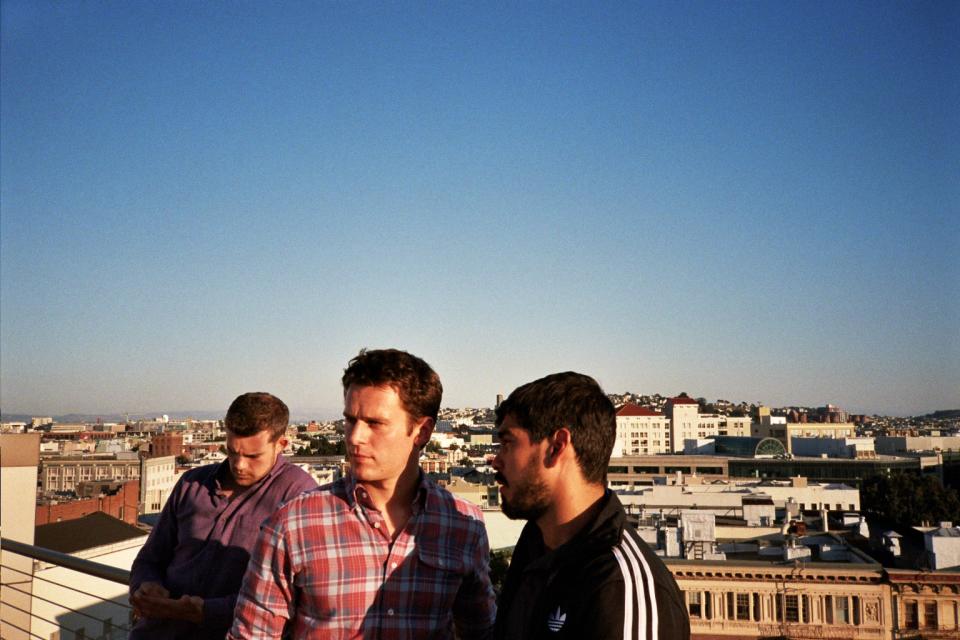
Despite its mixed initial reception and its relative underperformance, the show made stars out of the main cast—especially Jonathan Groff.
Groff: Between the first and second season in New York, they had asked me to be the grand marshal of the Gay Pride Parade—because of the TV show, and because I'm a New Yorker and had done a lot of theater. I felt scared to do it. I said yes, because my head and my heart were telling me that I wanted to do it, but there was a huge part of me that felt incredibly fearful, incredibly insecure, and incredibly scared. I did it anyway, and that was also a ring of fire moment. Doing the Gay Pride parade, being on the front, waving at people, and being so visibly out—it was just a constant experience of being, in a great way, pushed outside of my comfort zone.
Alvarez: He was coming off of this breakup and he's meeting somebody new and he's encountering all these feelings of being out in public and what his image represents to other people. And so you're swirling with all these other things, and also you're like, just a man trying to love other men.
Groff: I remember, oh my God, talking about douching [in a scene on the show], and I had never really douched before, as myself. Frankie Alvarez came with me. What we did in the show, where we go to the Walgreens? We actually did [that] in the West Village in real life, where he walked with me to get a fucking anal douche, and also a dildo to experiment with. He was in the gay sex shop with me, doing that in real life.
Alvarez: It was a moment of vulnerability, where he wanted to go dildo shopping, but he didn't want to be alone. He could have called any number of his gay friends, but he called me. And it was a testament to our friendship that he trusted me, that even though I was straight, he understood that he had a supportive friend there through that time. I was Doris.
As the series continued, the team looked to their cast for inspiration, sometimes borrowing elements of their personal lives and using them in storylines.
Groff: I remember sitting in a diner in San Francisco with Andrew and talking him through my most recent breakup as he was writing the big, final episode of season two and the fight between Kevin and Patrick—literally, me recounting and him writing down things that I said, that we said to each other, to get that in there. Everybody was offering up their own stories the whole time. It was incredible.
Bartlett: We had to be a little mindful of talking around Andrew and Michael because they'd just put stuff in the show. A lot of stories that we would tell to each other just hanging out, a version of them would end up in the show.
One of the new characters Looking introduces in season two is Eddie, an HIV-positive social worker bear who becomes a love interest for Agustin. The character was played by Daniel Franzese, best known for the role of Damian in the original Mean Girls. Cuba had discovered him as a teenager and cast him in Larry Clark’s Bully in 2001.
Cuba: Full circle moments for me are very exciting. Because you become really invested in this person, and then you watch their journey and sometimes you're not in touch forever. [Franzese] wasn't even out when I met him [for Bully], even though he was at a gay bar. He was so young, and I was just scouting gay bars in Florida. So I had a real tenderness for him and I knew he was great. He came in, auditioned, killed it.
Daniel Franzese (Eddie): I was able to face the fear of being liked enough to be a lead in an HBO show, face the fear of being naked, face the fear of doing sex scenes, face the fear of not only coming out as gay but people maybe thinking I was HIV-positive because I was playing an HIV-positive character. And literally stepping into my queerness in a way that I could be unequivocally proud of not only me, but every single version of the LGBTQ rainbow, at the same time in one character. Playing Eddie informed Daniel, myself, how to behave in life.
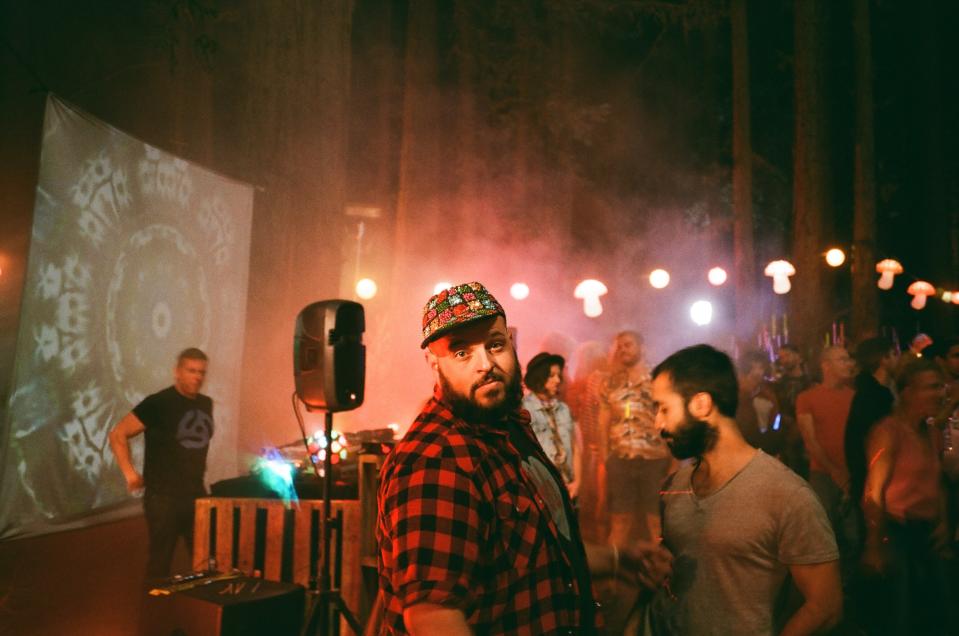
Alvarez: Representation matters for this exact reason. You see yourself reflected out there, and it shows you the potential of what your life could be.
Franzese: There's a scene where I meet Russell Tovey for the first time, and we're going to watch the rugby game. I'm like, “Yo, what's your deal? Hey, what's up with you?” And I'm like, “Man, how bold for this guy to be hitting on this really hot guy, who I would think might be out of Eddie's league, but he doesn't think he has a league.” And the way he actually responded, it made Russell actually in real life flirt with me in a way that I was like, “This is kind of crazy. I have a certain power here.”
I wanted to go as far as they would let me go because it just needs to be seen. It just needs to be normalized. There's different kinds of bodies, different kinds of people fall in love. I found it really groundbreaking because I can't, to this day, even think of another gay show that has a bigger guy having sex on it.
Halfway through the series, Lauren Weedman’s life was turned upside down by two devastating events—the end of her marriage, and the sudden death of her friend, the Silicon Valley actor Christopher Evan Welch. Around that time, they shot the seventh episode of season two, which is essentially a road movie about Doris going home to Modesto for the funeral of her father, accompanied by Patrick and Dom.
Weedman: The one thing I remember was, before we did the scene where I go see my dad's dead body, the three of us were sitting in this real funeral home and we're just talking about different times in our lives we'd seen a dead body and what that's like. I had just seen my friend Christopher's body and Jonathan had been through Cory Monteith’s [death]. We were telling all these stories that were just very intense.
And then I remember after we shot the scene, that Murray came to my trailer and just walked in, and we both just cried and cried and cried. And that's pretty rare, that actors aren't just on the phone, working out their next job, figuring out how they're going to renovate their house, how they're going to spend their money—they're not jerking off their ego in some way or some kind of “building their empire.” That wasn't going on—these were just sensitive boys.
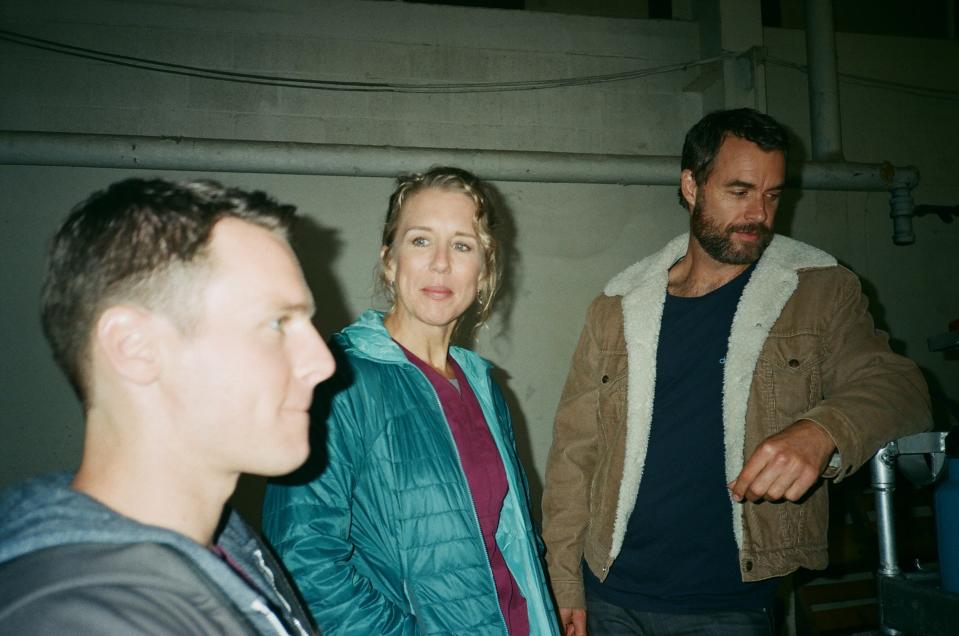
The show’s soundtrack is remarkably wide-ranging. And while the music selection—everything from the ‘90s dance diva CeCe Peniston to indie cult hero Arthur Russell—mostly came from Haigh, Lannan and the writers room, the show’s most memorable needle drop was an idea that came from Groff and Tovey. Watching the British singer Jessie Ware perform in San Francisco, the two actors discover her ballad “Say You Love Me” and became determined to get it on the show, for a scene in season two where Patrick and Kevin slow dance at a gay prom night.
Groff: We asked them, begged them, encouraged them to play, “Say You Love Me” while we danced. They're like, “Well, we'll play it for you now, but who knows with the rights and whatever, if we're going to end up using this song.” That's what they played that day and then they ended up using it in the show.
Jessie Ware (singer-songwriter): It was so magical with how it happened. They were moved by the song—it wasn't execs, it wasn't the industry. It was two actors and two friends coming and enjoying a moment. I think it's wonderful what's happened with What's Your Pleasure? and That! Feels! Good! [the albums that made Ware a gay icon] but I believe I had a queer following from important moments such as being on Looking, in this incredibly beautiful, poignant, touching part of the show.
Despite a more enthusiastic critical reception for the second season, the ratings take a dip, following a time slot change. HBO soon decides to cancel the series.
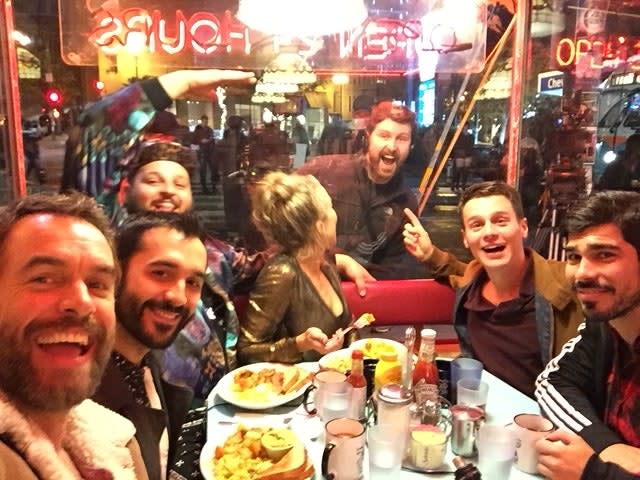
Condon: Look, I think HBO knew that it was a specific audience, so it wasn't going to be as big as Sex and the City or something—I don't think they had that kind of an expectation. But I think they hoped probably that it would be similar to Girls. It's going to be indie and a little alternative and whatever, but I think they were hoping—as one always does—for as much crossover audience as they could get. And I guess it wasn't as much as they wanted.
[Former HBO president of programming] Mike Lombardo had real affection for the show. He was like, “I don't really want to cancel it—but the ratings, it's hard for me to justify it continuing to go.” But I think because Andrew is such a filmmaker, and it was so clear that that was a lot of what was beautiful about the show, it just felt really natural [to do a movie].
Haigh: I remember coming into the writing room saying, “I want to end this song with a pretty unknown Housemartins track.” I can't tell you why I love this song [“I’ll Be Your Shelter (Just Like A Shelter)”].
If you listen to the lyrics of the song, it's pretty much a song about socialism, there's something about being there for each other. All of that's in the words of that song. It's uplifting but sort of sad, and we're pulling away from a shot of the Castro. It's like time is moving on and everything's changing, but the Castro holds something really special.
Weedman: The last scene we shot of the Looking movie, it was in this cafe on the Castro and they wanted to shoot it so that the last scene would be the sun coming up over the Castro. And so we had to wait to shoot the scene until 4:30 in the morning or something. We did the last scene and Andrew comes in and he goes, “That's it. Looking's done, we're done.”
We all go outside and the sun was coming up on the Castro, and I had this moment of, I felt like—I didn't literally hear the voices of all the boys that came to the Castro—but I was like, “It matters. We were part of this history of these boys who are trying to save their lives by being here, who lost their lives in the '80s…” This is one thing that I've hit that matters in the history for gay, queer people all over the world. I just was super affected by it. Murray and I were very, very blitzed out on this, like, “Wow, man. We actually touched something for a second."
Bartlett: I think we felt, making Looking there, that there was a sort of responsibility to try and do justice to that city and to tap into that history and that kind of joy and pain and all the things that have allowed us to be freer and have some of the rights that we have now. A lot of that stuff came from struggles and amazing stuff that happened in that city. You couldn't help feeling that there. It was a privilege.
In the aftermath of Looking, the cast and crew found themselves permanently changed. The experience of making the series affected everything, from their career decisions to their everyday lives.
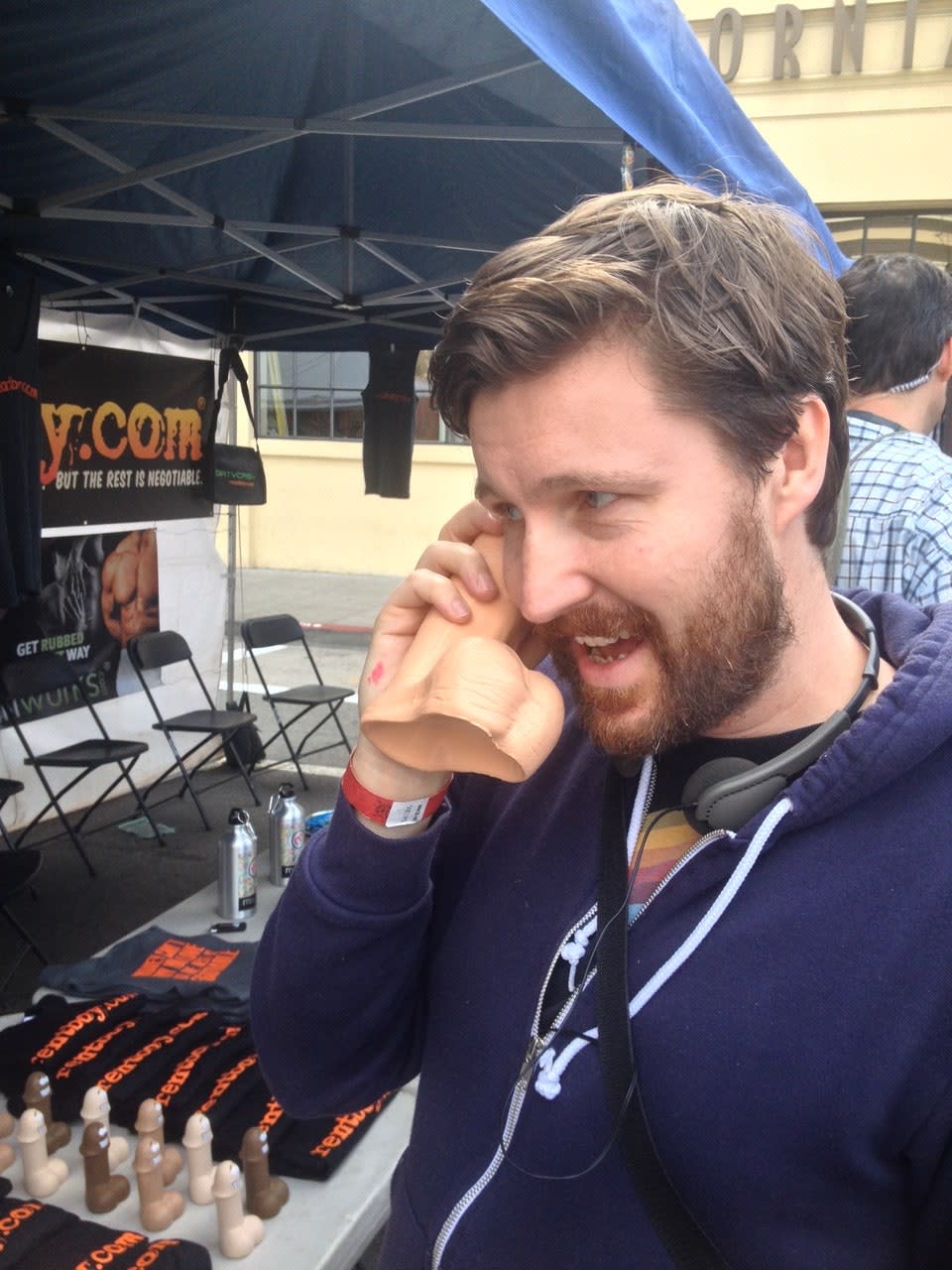
Groff: It brought me out of my own skin in a way that I don’t know if I would’ve otherwise. And every set I walked onto after that, every rehearsal room I walked onto after that, I didn't feel insecure about my sexuality. Looking and the experience of being on that set with all those people was so liberating, and really, truly life-changing.
Franzese: Whatever the situation is, you have the right to be comfortable in your skin, and honestly, the show really helped me be that. I can't tell you how crazy it is to go from my first movie [Bully] where I felt really nervous on set because I was being harassed for being queer, and then to be on this [project] where it's not only okay to be queer, but cool.
Weedman: All the people involved with it were so great that there really was not one asshole in the group—which, working in TV, that's rare.
Bartlett: It's become my kind of compass in terms of what I look for in work. It's not like I don't want things that are challenging—I do. But I want to have a great experience with people who also want to have a great experience, who are base-level kind.
Cuba: I'm sure you've figured out by now [that] for most of us, it was pretty life-changing. Even just our friendships. I look back, and the people that I met and worked with on that show are my closest people now. We're definitely in our lives together.
Condon: We've done about a yearly reunion.
Bartlett: Raul got married last year and a bunch of us were able to go—it was sort of a Looking reunion really. It was like, “Oh my God, this is our 10-year reunion.” And it was about Raul's wedding, but it was also a bunch of old friends getting back together and a lot of us from Looking days.

Castillo: Jonathan married [my wife and I] this summer so it's like a full circle.
Groff: That girl that he was talking about [while shooting the pilot] ended up being his wife.
Ten years later, many of the actors who starred in Looking have become bonafide stars. Jonathan Groff has appeared in generational projects on stage and screen, from Hamilton to Mindhunter to Frozen. Russell Tovey has appeared in shows like Quantico, American Horror Story: NYC and the upcoming Feud: Capote Vs. the Swans. O.T. Fagbenle, who had a minor role in season one as Agustin’s boyfriend, has gone on to do shows like The Handmaid’s Tale and appeared in the blockbuster Black Widow. And of course Murray Bartlett continues to be a staple of prestige TV, starring in The Last of Us and The White Lotus, which he won an Emmy for.
Alvarez: When Murray won the Emmy—which was a big deal for all of us—the Looking text chain blew up.
Weedman: Sometimes I'm watching everybody. For a while, I was like, I may have to mute people for a little bit, even though I love them so much. Because I watched everybody just go va-va-va. These boys, because they're so cute and they're so talented. And I did not do the same thing. I get jobs, but I don't get the same kind of work. I mean, I just don't. I accept my fate. And it's starting to wane a bit. But boy, was that hard in the beginning. They all deserve it, but I was like, “But how come I don't have it? I don't get it.”
Tovey: That show should have catapulted her into superstardom. She should be as big as fucking Jennifer Aniston now.
Franzese: Being a fat queer person, I get pushed to the end all the time when it comes to this kind of stuff. I've been in this business for 20-something years, [and] I'm still having to navigate the space of being an other. I'm still a very working-class actor. I still haven't gotten the full-on invite from everyone to join whatever club it is in Hollywood that gets to not worry about where their next job's coming from.
Alvarez: I’ve had some successes since Looking. But there are times when I feel like, did I disappoint Andrew? Did I disappoint Carmen? The potential that they saw in me—did I not reach that potential?
Cuba: I know the struggle it takes to stay in the game and how much luck is involved. The idea of something like Looking coming along again is so unlikely. So we're all just… I haven't had something like Looking again either.
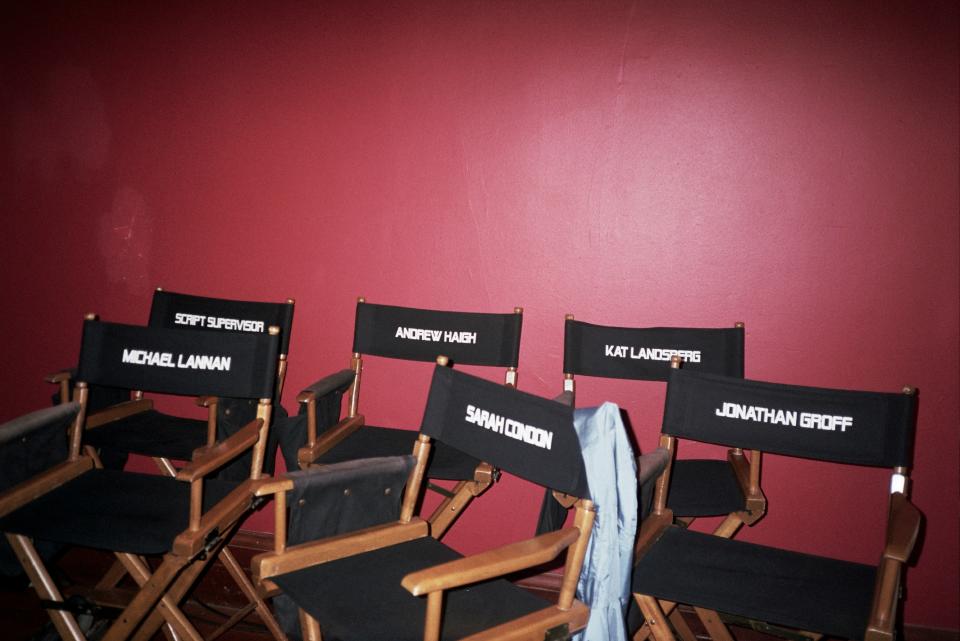
Looking has found a happy afterlife in the streaming age. During the pandemic, younger viewers seemed to suddenly discover the show, posting on social media about Looking and its characters. And as Andrew Haigh’s reputation as one of independent cinema’s great auteurs continues to be burnished through films like the arthouse hit All of Us Strangers, Looking continues to find new viewers as part of the director’s body of work.
Lannan: I love it when new memes show up every now and then. I'm so pleased that it still resonates and people still want to meme about it. That's the greatest compliment.
Condon: I think maybe it would've done a little better in a streaming universe, just in terms of the way audiences consume things now.
Groff: Even if the show didn't hit the way that we all wish it would have, it still affected people, including us, and it looks like that is the art that stays. I mean, I'm on Merrily We Roll Along right now. Forty-two years ago, it was a Broadway flop, and it's such an extraordinary show. People are finally, including me, getting to experience it for the brilliant thing that it is. And so that's encouraging, moving forward, that even though it might not be celebrated in the moment [it might have a moment later on].
Weedman: I had an Uber driver from a country where you can't be gay. He was like, “I would pretend that those [guys on Looking] were my friends and it really, really, really mattered.”
Cuba: To me, it was just about friendship, about male friendships specifically. It wasn't about gay male identity as much as just this love and this friendship that, to me, we hadn't really seen before. Because I have two sons too, I just was like Oh, this is a dream. This group of friends is what I dream for my children.
Franzese: Since day one, I've been like, “Can we get together for a Christmas movie or something?” I'm ready for it.
Alvarez: We nudged the door open for more nuanced LGBT storytelling. The issue is we didn't get to go through that door. We nudged it open for shows like Heartstopper that have been able to take that baton and push the envelope forward. So the hope is now, maybe there's room for us to come back. Wouldn't it be amazing to go back to Dolores Park and it's Agustin's 40th birthday now?
Condon: I do think there's something interesting about these characters getting older and where are they now? We'll see if we can convince Andrew and Casey [Bloys, CEO of HBO]. I’m going to try to make it happen.
Tovey: Let's do The Comeback—Lisa Kudrow did [the second season] 10 years later, so why can't Looking come back?
Castillo: A lot of shows come and go. They have huge viewerships and then people forget about them the next day. But I feel like with Looking, it's like the audience has just grown and grown and grown and grown.
Groff: I mean, ultimately, not enough people watched it, and we went off the air—that's just the story of what happened with the show. But the fact that it only lasted for two seasons and a movie, and 10 years later, we're still talking about it, there's something about the staying power of the show, and the people that continue, a decade later, to talk about the impact that it has had on them. It sort of helps heal those wounds of feeling rejected.
Originally Appeared on GQ

